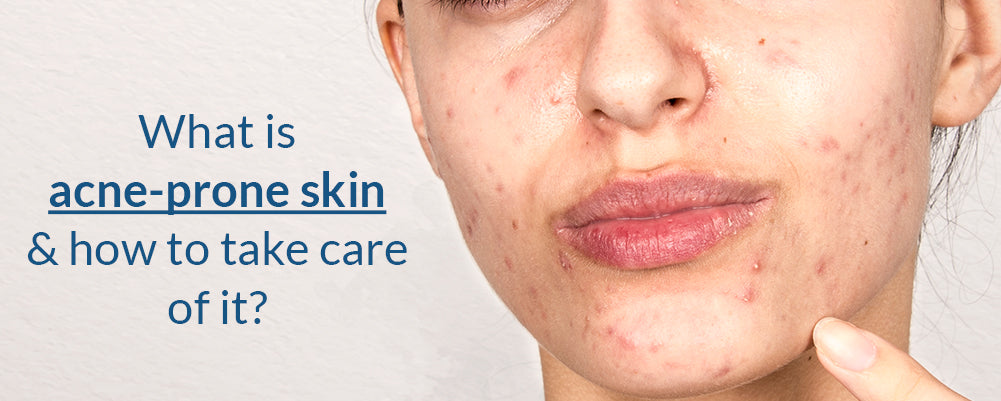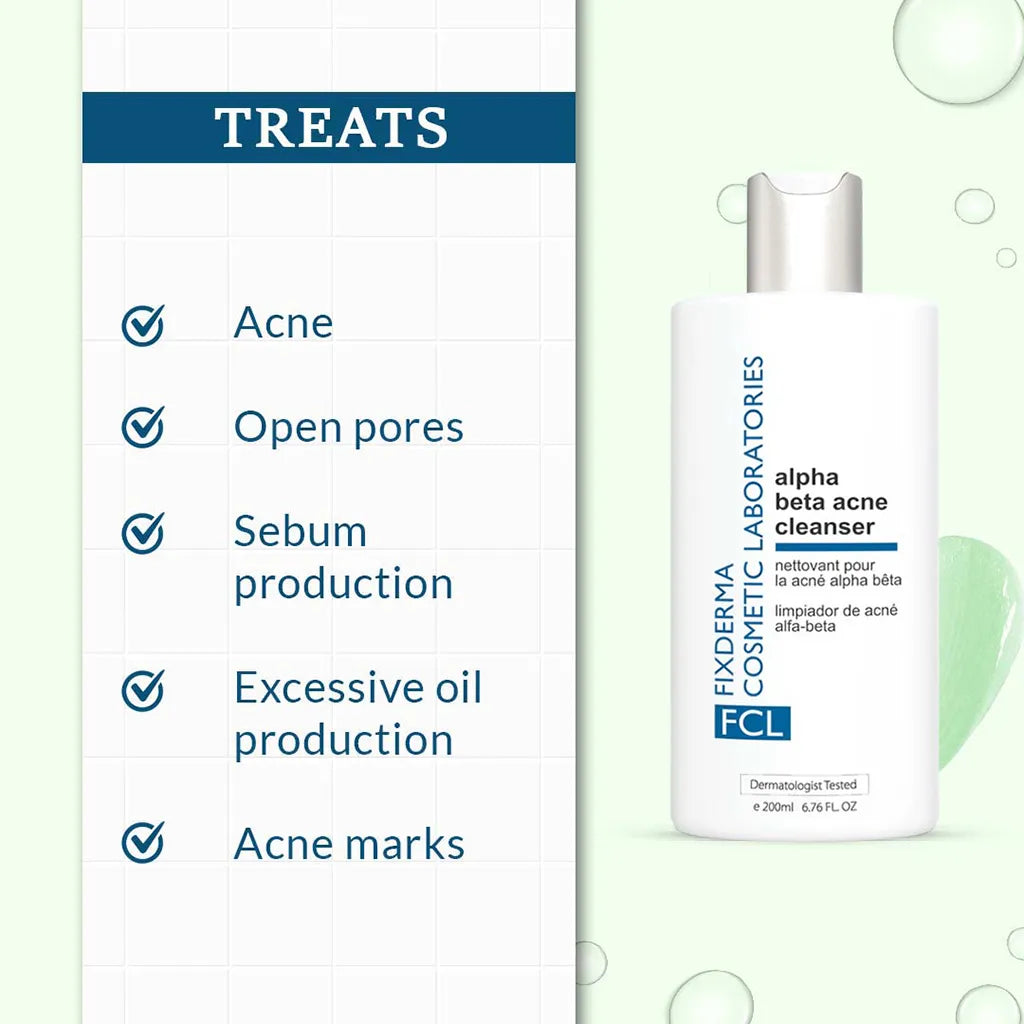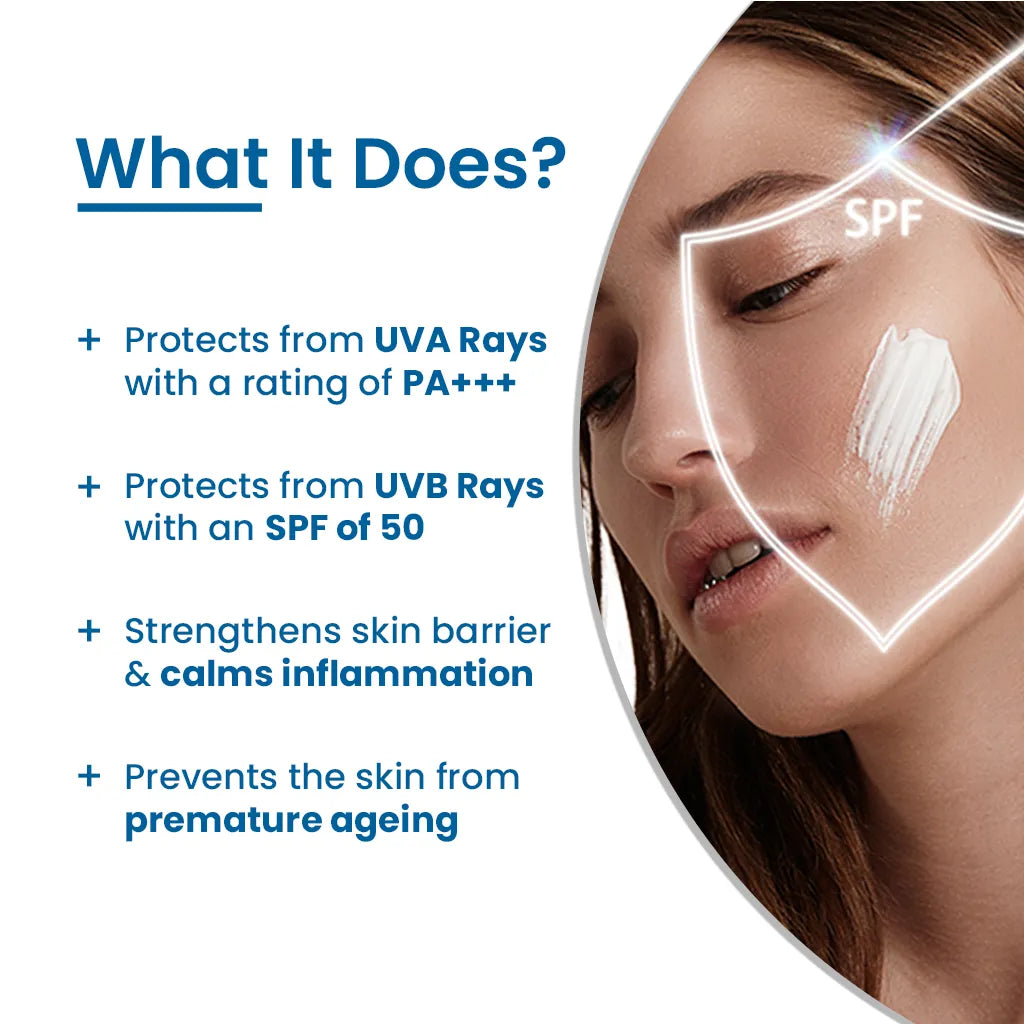
What is acne-prone skin and how to take care of it?
By: Sandip KumarAre you tired of waking up to unwelcome visitors on your face? Those pesky, persistent little troublemakers that go by the name of acne can certainly put a damper on anyone's day. But fear not! Understanding your skin is the first step towards achieving a clear, radiant complexion. Acne-prone skin is when your skin is more likely to get acne. It's like a battleground where oil, dead skin cells, and bacteria fight against each other. Unlike smooth skin, acne-prone skin is more sensitive and can easily get inflamed, leading to pimples, blackheads, and whiteheads.
Our skin has small pores known as sebaceous glands. These glands make a natural oil called sebum, which helps keep your skin moisturized. But sometimes, these glands produce too much sebum, which clogs your pores and gives bacteria a chance to grow.
There is one more aspect of acne-prone skin that is challenging—it's called hyperkeratinization. This means that dead skin cells build up more than usual, which can also clog your pores and cause inflammation. So, it's like a city where bacteria, oil, and dead skin cells team up to create acne.
You might wonder why your skin is more prone to acne than others. Well, it's partly because of your genes. Your family history, hormonal imbalances, stress, diet, and even the environment can all make your skin more likely to have acne. By understanding what causes acne and following a good skincare routine, you can take control of your skin. Making small changes in your lifestyle can also make a big difference in getting rid of acne and having clear, healthy skin.
So, if you're ready to say goodbye to acne and hello to a glowing complexion, keep reading to know more about acne-prone skin. Together, we'll discover the secrets to getting rid of acne and having skin that makes you feel confident and beautiful.
How to know if you have acne-prone skin?
Determining whether you have acne-prone skin is a crucial first step in developing an effective skincare routine. Here are some key signs to look out for that may indicate you have acne-prone skin:
- Frequent Breakouts: If you notice that you experience frequent breakouts of pimples, blackheads, or whiteheads, especially on your face, chest, or back, it could be a sign of acne-prone skin. These breakouts might be recurring or stubborn, taking longer to heal compared to others.
- Oily Skin: Excess oil production is a common characteristic of acne-prone skin. If your skin tends to feel greasy or looks shiny throughout the day, particularly in the T-zone (forehead, nose, and chin), it indicates overactive sebaceous glands producing more sebum than necessary.
- Clogged Pores: Acne-prone skin is prone to clogged pores due to the combination of excess oil and dead skin cell buildup. You may notice the presence of blackheads (open comedones) or whiteheads (closed comedones) on your skin, which are caused by trapped oil and debris within the pores.
- Inflammation and Redness: Acne-prone skin is often more sensitive and reactive, leading to inflammation and redness around active breakouts. You may experience tenderness, swelling, and the formation of painful, inflamed pimples or cysts.
- Scarring and Hyperpigmentation: After breakouts heal, acne-prone skin tends to be more prone to developing post-inflammatory hyperpigmentation or acne scars. These can leave behind dark spots or uneven skin tone that lingers long after the acne has cleared.
- Hormonal Fluctuations: If you notice that your breakouts worsen or become more frequent during specific times of your menstrual cycle or when undergoing hormonal changes, it could be an indication of acne-prone skin. Hormonal imbalances can stimulate sebum production and trigger acne breakouts.
- Family History: Acne-prone skin often runs in families, so if your parents or siblings have a history of acne, you are more likely to have it as well.
If you observe several of these signs, it's likely that you have acne-prone skin. Understanding your skin type allows you to choose suitable skin care products and establish a routine that addresses your specific needs, helping you achieve a clearer, healthier complexion.
What can you do to take care of acne-prone skin?
Taking care of acne-prone skin is important to keep breakouts at bay and maintain a healthy complexion. Here are some effective tips to care for your acne-prone skin:
- Cleanse gently: Use a mild, non-comedogenic cleanser to wash your face twice a day. Avoid harsh scrubbing or using abrasive products that can irritate your skin and worsen acne. Pat your skin dry with a clean towel instead of rubbing it.
- Avoid excessive touching: Refrain from touching your face frequently as it can transfer bacteria and oil from your hands, leading to clogged pores and breakouts. Be mindful not to squeeze or pick at your pimples, as it can cause further inflammation and scarring.
- Use non-comedogenic products: Look for skincare or cosmetic products labeled "non-comedogenic" or "oil-free." These products are less likely to clog your pores and aggravate acne. Avoid heavy or greasy formulas that can add to the oiliness.
- Moisturize appropriately: Even acne-prone skin needs hydration. Opt for lightweight, oil-free moisturizers that won't clog your pores. Moisturizing helps maintain the skin's barrier function and prevents excessive dryness, which can trigger more oil production.
- Protect from the sun: Apply a broad-spectrum sunscreen with at least SPF 30 daily, regardless of the weather. Sun exposure can worsen acne and lead to post-inflammatory hyperpigmentation. Consider mineral-based sunscreen.
- Be cautious with makeup: If you wear makeup, choose non-comedogenic, oil-free, and fragrance-free products. Remove makeup thoroughly before bed to allow your skin to breathe and prevent clogged pores. Avoid heavy liquid formulas.
- Avoid irritants: Stay away from harsh, abrasive, or fragranced skincare products that can irritate your skin and trigger breakouts. Limit your exposure to pollutants and consider using a gentle, non-alcoholic toner to remove residual impurities.
- Practice gentle exfoliation: Exfoliation helps remove dead skin cells, but it's crucial to be gentle. Choose chemical exfoliants with ingredients like salicylic acid or glycolic acid, as they can unclog pores effectively. Start with a lower concentration and frequency to avoid irritation.
- Maintain a healthy lifestyle: Eating a balanced diet rich in fruits, vegetables, whole grains, and lean proteins can support healthy skin. Manage stress levels, exercise regularly, and get enough sleep to minimize hormonal imbalances that can contribute to acne.
- Consult a dermatologist: If over-the-counter products don't seem to improve your acne, or if you have severe or persistent breakouts, seek professional help. A dermatologist can provide personalized advice, prescribe medications if need, and guide you through your acne treatment journey.
What are the top 3 best acne products?
When it comes to treating acne, there are several effective options available. Here are three top acne treatments that can help you achieve clearer skin:
-
Alpha Beta Acne Cleanser: This cleanser contains 2% Salicylic Acid and 1% Glycolic Acid. Salicylic Acid helps unclog pores, reduces inflammation, and prevents future breakouts. Glycolic Acid helps exfoliate dead skin cells, revealing smoother skin. This combination can effectively combat acne-causing bacteria and promote a healthier complexion.
- Deeply cleanses the skin
- Unclog pores
- Soap-free formulation
- Reduces blackheads and whiteheads
- Gently exfoliates the skin
-
Alpha Beta Acne Gel: This gel combines the power of 2% Salicylic Acid and 6% Glycolic Acid. Salicylic Acid penetrates deep into the pores, removing excess oil and bacteria. Glycolic Acid exfoliates the skin, promoting cell turnover and reducing the appearance of acne scars. Together, these ingredients work to target acne, minimize breakouts, and improve overall skin texture.
- Reduces blackheads and whiteheads
- Dissolves oil & dead cells accumulated in pores
- Prevents acne formation
- Control excess production of sebum
-
Chemfree SPF 50 Physical Sunscreen: This sunscreen is a mineral-based formula that offers broad-spectrum protection with SPF 50. It is non-comedogenic, which means it won't clog your pores. It contains niacinamide, which helps regulate oil production and soothes the skin. Additionally, the presence of squalene provides hydration without greasiness. This sunscreen is also reef-friendly, making it environmentally conscious. Protecting your skin from the sun is crucial, as sun exposure can worsen acne and cause hyperpigmentation.
- Beneficial in oily and acne-prone skin
- Broad-spectrum UV protection
- Nano-free
- Non-comedogenic
- Oil-free and non-greasy formulation
- Lightweight
Remember, consistency and patience are key when caring for acne-prone skin. With proper care, you can achieve clearer, healthier skin.
Read more - Which Is The Best Shampoo For Hair Thinning?

